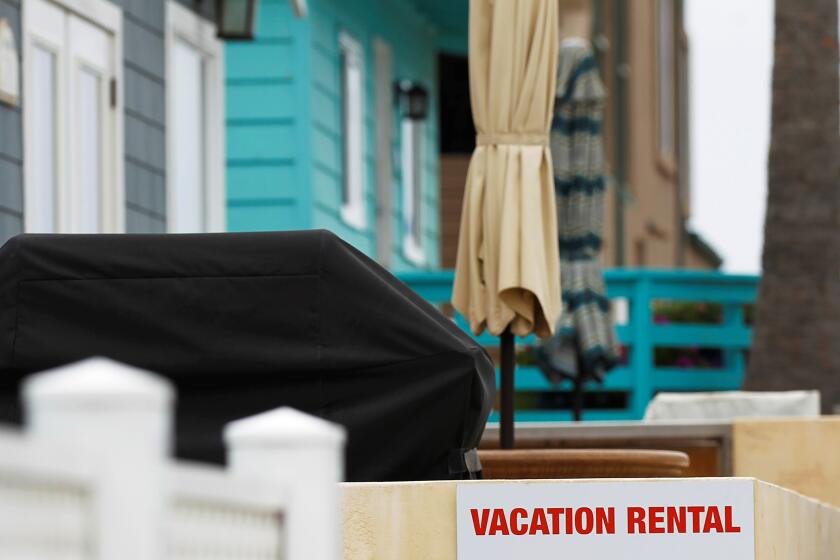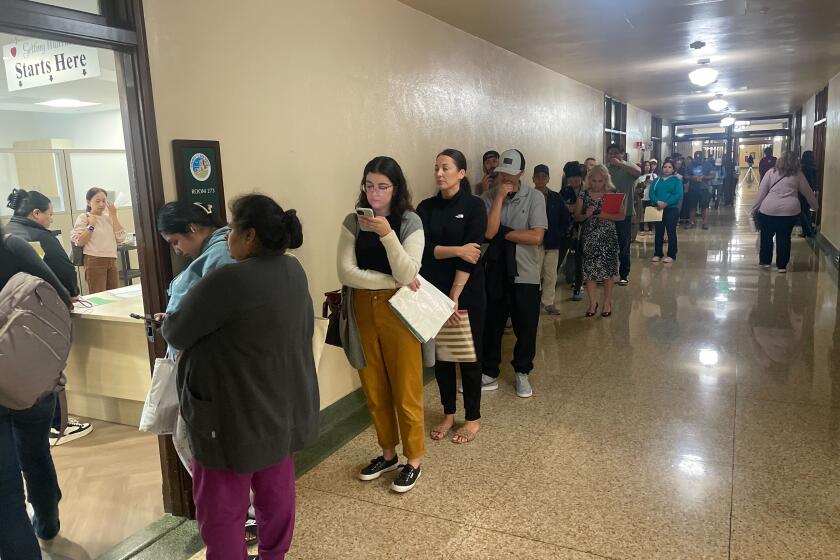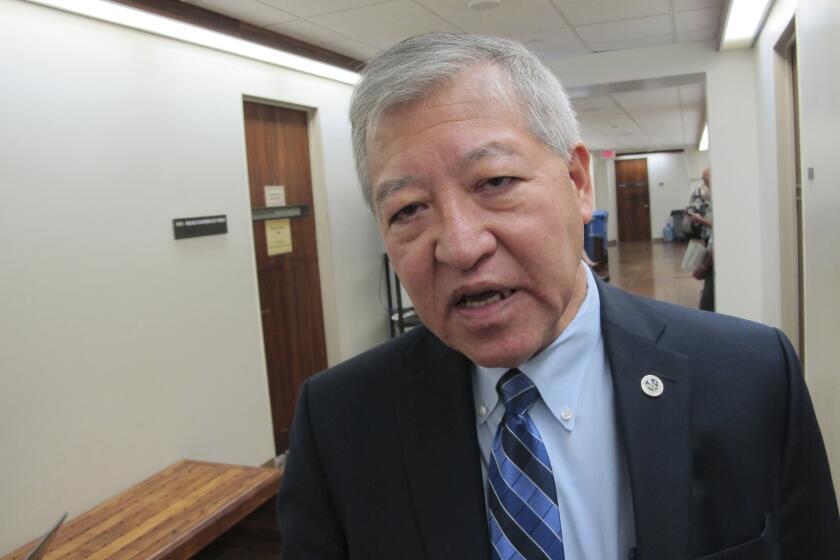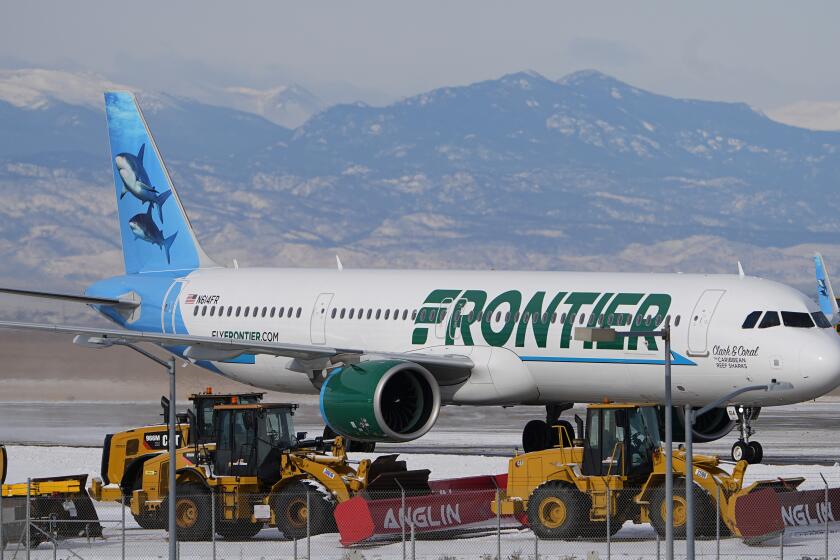KUSI, longtime independent San Diego TV station, to be sold to Nexstar for $35M
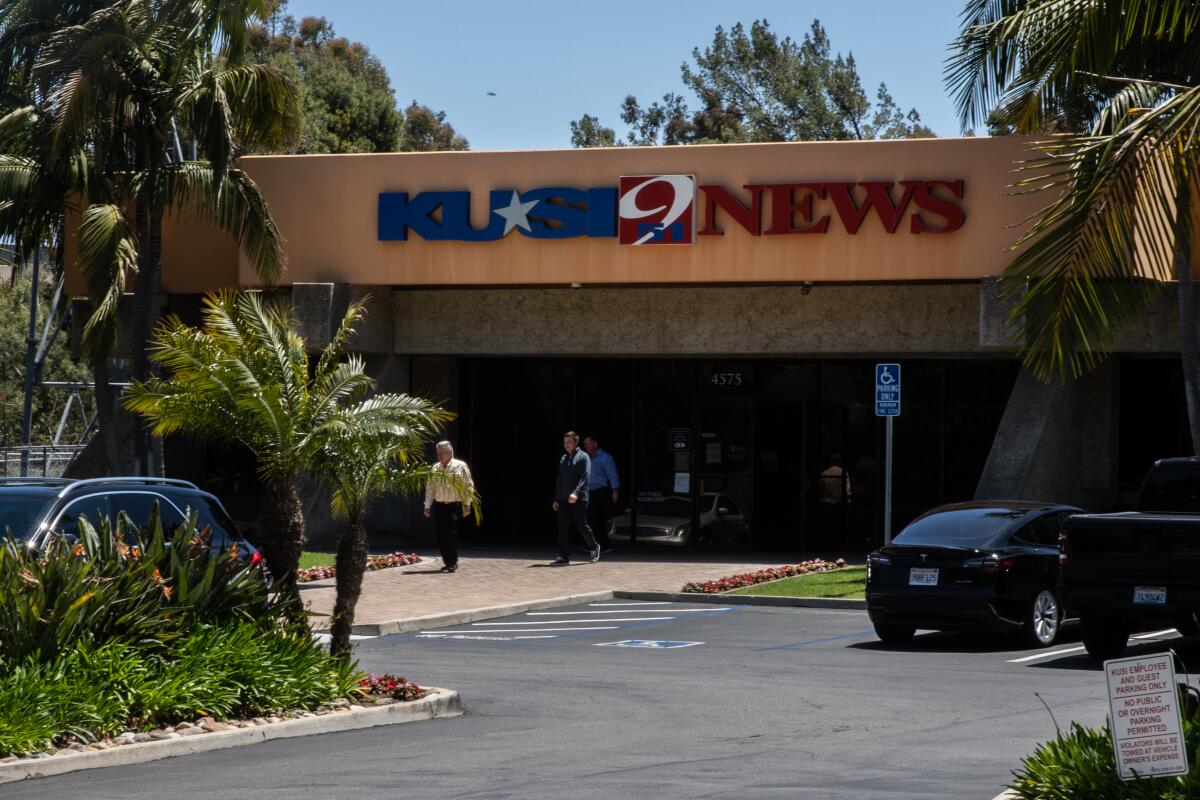
Nexstar Media Group, which already owns Fox 5 San Diego, is buying KUSI. The acquisition is expected to merge some operations.
Longtime independent news station KUSI will be purchased by media conglomerate Nexstar Media Group for $35 million.
Texas-based Nexstar already owns Fox 5 San Diego and is a majority owner of The CW, which operates in several California markets. It’s unclear at this time what a merger of operations could look like.
Update:
3:35 p.m. May 8, 2023Added interview with Mike McKinnon, owner and CEO of KUSI.
Nexstar said in a news release Monday that the purchase is expected to take place around the same time it pursues a new CW affiliation for the area. If that occurs, it may turn KUSI into a CW affiliate, although a spokesperson said it was too soon to comment on programming for KUSI.
KUSI has been a staple in San Diego for 40 years, covering everything from local high school sports to investigating consumer issues and politics.
The station also featured chief meteorologist John Coleman, who was a co-founder of The Weather Channel. San Diego viewers knew Coleman for his signature exaggerated pronunciation of the station name, KUUUUUU-SI, during his colorful weather reports.
Mike McKinnon, owner and CEO of KUSI, said the decision to sell the broadcasting company now comes as it’s been increasingly difficult to operate as an independent business in today’s media landscape.
“It’s getting tough for independent stations that are locally owned to compete in today’s world,” McKinnon said in a phone interview with the Union-Tribune on Monday. “You have streaming going on, you’ve got a lot of different things you get media on besides TV. And so being part of a big group makes it financially easier to get done.”
The McKinnon family put KUSI on air in 1982, and McKinnon called it a “career project,” after already owning a few stations in Texas. McKinnon grew up in San Diego, where his father worked in the newspaper business, so he knew the area well.
“To come back here and be able to own a station in San Diego and be independent was great, I mean, during the run,” he said. “But time kind of ran on us with all the other media, and we just had to join up with a bigger group and to keep it going.”
He said that his family will exit with the sale of KUSI to Nexstar.
The station produces roughly nine hours of local news each weekday. Nexstar said in a news release that KUSI and Fox 5 San Diego will offer more local news combined than the other local stations. It declined to speculate on programming, or if the news operations of both stations would be merged.
“KUSI-TV’s established local news operations serving viewers and advertisers across the San Diego community is a perfect fit with our station group and existing San Diego operations at KSWB-TV (Fox 5 San Diego),” wrote Nexstar president Tom Carter, in the news release.
The deal is still subject to regulatory and other customary approvals, but it’s expected to close later this year.
KUSI recently lost a whistleblower lawsuit in which former news anchor Sandra Maas alleged she was underpaid. A jury awarded her nearly $1.6 million, saying the station violated equal pay laws by paying her substantially less than her longtime male co-anchor.
While financials played a role in the KUSI deal, McKinnon said it was not influenced by the recent lawsuit. McKinnon said that he’s had a longtime relationship with Perry Sook, CEO of Nexstar, and trusts that it has the resources to continue what KUSI has built.
“Local is what pays off,” McKinnon said. “Everybody’s national, but if you’ve got a good local operation — it’s work, it takes a lot of work to get a good local operation — but that’s what really pays off in broadcasting.”
As for the programming, he hopes that the station will increase its news coverage, offer more in-depth coverage and that other markets will catch on to KUSI’s hyper-local way of operating.
“We’ve enjoyed the tremendous amount of people who’ve been on the air with us, in sports and news and various organizations,” he said. “And we’ve really appreciated the reception we’ve gotten over the years here.”
It hasn’t always been easy.
KUSI’s political coverage has been the subject of criticism, such as its 2019 segment with Rep. Duncan D. Hunter. The public official — who was in the middle of a financial scandal — agreed to an exclusive interview with KUSI under the condition that his team approved all of the questions.
Even though the station disclosed that the interview subject had provided the questions, the situation represented a departure from typical journalism practices, according to journalism professors and experts in media ethics.
The McKinnon Broadcasting station has characterized itself as “widely viewed in San Diego as a right-of-center news organization.” Over the years, the McKinnon family has supported and donated to GOP campaigns.
While it is yet to be officially determined by Nexstar, McKinnon said he believes it is likely that KUSI will become a CW affiliate.
San Diego media expert, Edward Quinn, agrees that KUSI becoming a CW affiliate is a likely possibility. He added that there is a possibility the station might consolidate resources with Fox 5, which is also owned by Nexstar.
Quinn, who is retired and worked for decades heading the local ABC 10 news station as well as other affiliate stations in Bakersfield, Denver and Indianapolis, also said that could result in a change of programming but nothing major for the local audience.
“So, what it’s going to mean, essentially, is that there may be less local news on KUSI,” he said. “It may mean more consolidation with its sister station here in town, maybe. But there’s enough local news here in town. In other words, I don’t think it’s really going to affect the viewer.”
As an independent station, Quinn said KUSI was able to offer more local news than other nationally affiliated stations and they could run those programs in earlier, prime-time slots. Whereas other local stations might have to schedule their local programming around the national news broadcast or a late-night talk show.
“When you’re straight independent like KUSI was, you essentially have more programming and more airtime to show,” he said.
Quinn explained that it’s expensive for an independent station to pay for syndicated programs on its own, so it’s more cost-effective to join a big corporation.
In terms of overall viewership — not just for news — KUSI is at the lower end of ratings for stations with local news programs.
The most recent Nielsen Scarborough Report showed that KUSI reached 259,172 adults over a seven-day period in February. That compares to 798,529 for ABC 10 (KGTV); 792,253 for CBS 8 (KFMB); 770,723 for NBC 7 (KNSD); 714,840 for Fox 5 (KSWB) and 450,900 for KPBS.
KUSI’s non-news programming during the week includes “The Jennifer Hudson Show,” the “Sherri” talk show, reruns of “The Big Bang Theory,” “iCrime with Elizabeth Vargas” and “Family Feud.”
Miro Copic, a marketing expert and professor at San Diego State University, said this is probably a good time for the owners to sell because KUSI’s demographic is older than the other stations, making it difficult to get advertising dollars. Yet he said the station has a strong legacy in the region of very local news — especially sports, an alternative to the other stations and a track record of nurturing young reporters who went on to other places.
“It’s remarkable they’ve held a core audience for as long as they have,” he said.
Nexstar is the nation’s largest local broadcasting group, with 200 owned or partner stations in 116 U.S. markets. It is a publicly traded company (NXST), and its share price was up 1.3 percent Monday morning to $166.41.
Nexstar had $5.21 billion net revenue in 2022, said recent financial statements. Nexstar’s other assets include a 31.3 percent stake in Food Network and majority ownership of The CW and NewsNation.
Get U-T Business in your inbox on Mondays
Get ready for your week with the week’s top business stories from San Diego and California, in your inbox Monday mornings.
You may occasionally receive promotional content from the San Diego Union-Tribune.




